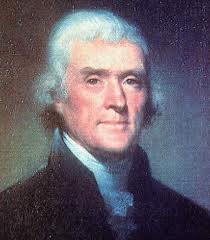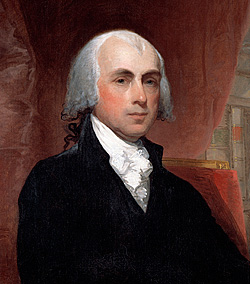The position of Secretary of State is the country’s premier diplomatic post.
James Madison and the Merrys
Anthony Merry was the first British Minister Plenipotentiary (considered Ambassador) sent to the United States. He and his uber pretentious wife Elizabeth were pompous and snobbish, according to all who knew them, but in 1803, Great Britain was approaching the apogee of its Great Britain-ness, and the little backwater country across the pond was perceived as a punishment tour of duty.
President Thomas Jefferson was rather obvious about his disdain for all things British, and the Merrys were no exception. They in turn, were enraged by what they perceived as deliberate slights from the President, who had invited them to a pathetically democratic (small ‘d’) dinner party. No seating plan, a suspiciously offensive invitation to the French Minister (with whom their country was at war), no entrance “honors,” and other breaches of basic British etiquette. While it is always difficult to picture the usually hospitable and sophisticated Virginian as deliberately rude, the Merrys did have a point. President Jefferson’s dinner was a travesty, according to the Ambassador, who made no effort to hide his anger. He had been insulted, plain and simple.
James Madison was Jefferson’s closest friend as well as his Secretary of State. He was also an intellectual and cerebral man, who was put in an awkward position: loyalty to a) his friend, and more importantly the President of the United States, or b) his assigned duty as Secretary of State, to placate an enraged ambassador.
Madison certainly needed to take his lead from the President, although he privately agreed that Ambassador Merry had righteous cause to be upset. European pompousness and pretensions have never set well with Americans, and in 1803, they set even less. But democratic or not, neither he nor President Jefferson was inclined to risk an international incident over trivialities.
Mrs. Madison’s Solution
Mrs. Dolley Madison was an adept hostess, and the widowed President Jefferson frequently called on her to do his honors when one of his daughters was unavailable. The Madisons occupied a fine residence near the White House, and the Secretary of State’s house had become a de facto center for entertaining social-political Washington.
After Jefferson’s fiasco at hosting Anthony and Elizabeth Merry, the Secretary of State stepped in to soothe the roiling waters as it were, and invited the couple to a dinner in their honor a few days later at their home, which was quickly becoming the place in Washington for meet-and-greets.
James Madison came from a well-to-do family with a thriving plantation in central Virginia, happy to have wagonloads of supplies sent from Montpelier to Washington, since all entertaining, official or not, was paid out-of-pocket by the host. Mrs. Madison held nothing back in her preparations for the Merry party; it would be damage control at its best.
The creme of Washington political hierarchy (save for the POTUS) were invited to an informal but sumptuous banquet. Mrs. Madison had an innate sense of classic style, and chose her wardrobe accordingly, elegant but simplistically democratic. Their table was set with their finest chinaware, crystal and silver. Meats and game, fruits, vegetables, baked goods and desserts were in profusion, along with fine wines. And it was done in a way that still echoed and enhanced the American style that President Jefferson espoused. Some claim Madison offered his arm to Mrs. Albert Gallatin, the wife of the Secretary of the Treasury, although historian Paul Boller says not. Boller adds, however, that the guest list included a local haberdasher and his wife, said by Dolley, to be “good company.”
The Merry sense of august propriety was once again inflamed, and determined that it still wasn’t good enough for the British Minister’s etiquette expectations.
Mrs. Madison Charts A Course
According to First Lady biographer Lewis Gould (and perhaps citing Margaret Bayard Smith, a prominent Washington resident and guest at the party), the smarmy Elizabeth Merry took her venom out on Mrs. Madison, publicly sniping that the Secretary of State’s table was “more like a harvest home supper” than a banquet for the representatives of the most powerful nation in the world.
Dolley, being Dolley, did not miss a beat, smiling and remarking that the “profusion of her table that was so repugnant to foreign customs was merely due to the happy circumstances of abundance and prosperity in my country.” There is no indication that the Merrys countered that remark, but the British Ambassador and his wife never attended another function in the Jefferson White House.
Margaret Bayard Smith related this story some thirty years after the event, which may or may not be apocryphal, but the sense of it remains true to core: Dolley Madison was a diplomat in her own way. She could charm when she needed to, use wit and humor on occasion, and always, always be trusted to say and do the right thing.
For eight years, the house of Secretary and Mrs. Madison was the center of social Washington. It was there that Dolley fine-tuned her hosting skills and talents, and formed fast and lasting friendships with politicians of all philosophical persuasions.
When she became mistress of the White House in 1809, the White House would become center stage for society, and she would be Washington’s unchallenged social leader for the rest of her long life, and the epitome of charm and tact that all First Ladies try to emulate.
Sources:
Allgor, Catherine, – Parlor Politics: In Which the Ladies of Washington Help Build a City and a Government, 2000, University of Virginia Press
Allgor, Catherine – A Perfect Union: Dolley Madison and the Creation of the American Nation – 2006 Henry Holt and Company
Boller, Paul F., Jr. – Presidential Anecdotes, Oxford University Press, 1981
Gould, Lewis L. – American First Ladies: Their Lives and Their Legacy – Routledge Press, 1996







Great story. Dolley seemed to always be at the top of the social game. Last night PBS had a special about royal clothes from Henry VIII down through Elizabeth II and how each used fashion to set the tone for the monarchy/citizens. Interesting.
Reblogged this on Practically Historical.
Anthony Merry was the third British ambassadorial representative and not the first as cited. As a republic and not a sovereign state, Britain considered that the position of Ambassador was inapproriate. The first “minister plenipotenary” was 28 year old George Hammond who handled British affairs between 1791 – 1795, including the early discussions which led to the signing of “Jay Treaty” in 1795 In 1796 Hammond was replaced by a more senior diplomat, Sir Robert Liston, who was given the title of “Minister to America”. Liston returned to Britain in 1800 and between 1800 – 1803, British affairs were handled by Britain’s Charge d’Affaires, Edward Thornton, who had travelled to America in 1791 as secretary to George Hammond. Anthony Merry was appointed Minister to America in 1803. He returned to Britain in 1806 and was replaced in 1807 by the Hon. David Erskine.